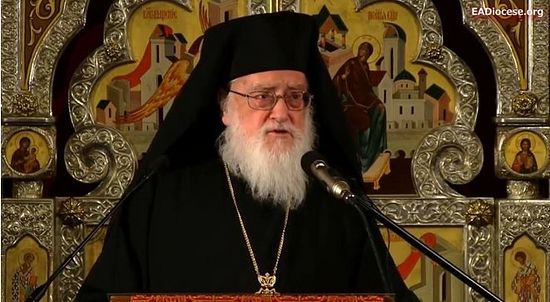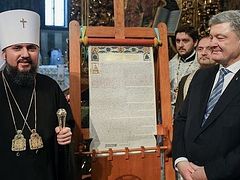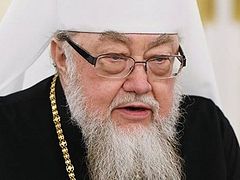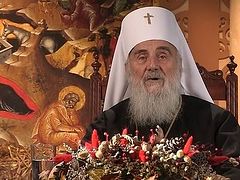Iași, Romania, January 17, 2019
His Eminence Metropolitan Kallistos (Ware) offered the keynote address at the recent inaugural International Orthodox Theological Association held in Iași, Romania from January 9 to 12. The event gathered hundreds of theologians from around the world under the banner of “Pan-Orthodox Unity and Conciliarity,” and His Eminence opened the conference with his talk “Synodality and Primacy in the Orthodox Church.”
Met. Kallistos went over the history of primacy and synodality in the Church and reflected upon the current state of the Church, making especially interesting comments on 2016’s Crete Council and the current crisis created by Constantinople’s interference in the Ukrainian Orthodox Church.
Noting that the Crete Council had been laboriously prepared for over the course of a century, His Eminence states: “The most significant thing about the Crete Council of 2016, viewed in this light, was that at long last the Council had finally met.”
Despite being a hierarch of the Ecumenical Patriarchate, Met. Kallistos allows himself to speak freely and independently. “Sadly the proceedings of the long-awaited Council turned out to be something of a disappointment. It was far from being pan-Orthodox,” he says, noting that 4 Churches didn’t attend, and the Orthodox Church in America wasn’t even invited. His evaluation is quite different than that of Patriarch Bartholomew who has continually praised the council as a great manifestation of Orthodox unity and a great event in the life of the Church.
Met. Kallistos says that while some may have hoped for an 8th Ecumenical Council before the proceedings began, no one views it that way now. He notes that it operated under different procedures than the Ecumenical Councils and that the council attempted to cover too much in too little time, while not addressing any serious problems facing the Church, such as autocephaly (including the issues of the OCA and Ukraine), the calendar, the reception of converts, the ministry of women, and gay marriage.
Moreover, in his view, the topics of the Orthodox diaspora and relations with the non-Orthodox were important but nothing important was said. In the end, he believes it is best to regard Crete not as a great pan-Orthodox gathering, but as the beginning of a process, noting that His Beatitude Patriarch Daniel of Romania had proposed holding a pan-Orthodox synod every 7 years.
In moving more directly into the topic of primacy and synodality, His Eminence makes a crucial point, especially important coming from a hierarch of the Patriarchate of Constantinople.
“While the Patriarchate of Moscow agrees with the Ecumenical Patriarchate that Constantinople holds the first place in the taxis or canonical order of the Orthodox Church,” he says, “there is no full agreement between them concerning the scope end the practical implications of this ‘first place.’”
Met. Kallistos’ common-sense comment runs counter to the propaganda coming from the Patriarchate of Constantinople and the Ukrainian schismatics, who repeatedly insist that Moscow dreams of being the Ecumenical Patriarchate, despite the lack of supporting examples.
And in addressing the current Ukraine crisis, he again supports the position of the canonical Ukrainian Church and the Russian Orthodox Church: “More serious is the conflict that has arisen in 2018 over Ukraine. The Patriarchate of Constantinople granted a tomos of autocephaly to the schismatic groups in Ukraine, to the so-called ‘Kievan Patriarchate’ under Philaret Denisenko and to the so-called ‘Autocephalous Church’ under Metropolitan Makary. Rejecting this decision, Moscow retains under its jurisdiction the portion of Ukrainian Orthodoxy that is headed by Metropolitan Onufry, which contains in fact considerately more parishes than the other two groups together.”
Again, Met. Kallistos is rejecting the propaganda that insists that the schismatic groups are larger and enjoy more support from Ukrainian believers.
And again: “While the Ecumenical Patriarchate sees itself as the Mother Church of Ukraine, it has to be acknowledged that for more than 330 years Ukraine has formed an integral part of the Russian Church. This is a fact of history, and, as Aristotle remarks, ‘Even God cannot change the past.’”
Patriarch Bartholomew’s insistence that Constantinople never ceded the territory of the Kiev Metropolia to anyone has apparently not convinced Met. Kallistos.
However, Met. Kallistos also takes issue with how the Russian Church has responded to Constantinople’s canonical violations: “At the same time, while reservations can be expressed concerning the policy of Constantinople, there is reason also to be disquieted by the decision of Moscow to break communion with the Ecumenical Patriarchate.”
“It has been said by the Fathers that to start a schism is worse than to commit murder. Schisms are easy to instigate but hard to heal. For seventy-five years, from 1870 until 1945, there was a schism between the Ecumenical Patriarchate and the Church of Bulgaria; and the cause was precisely the question of autocephaly. Let us pray that the present schism between the second and the third Rome will not last for three-quarters of a century,” His Eminence says.
Met. Kallistos made similar comments in an interview in early December.
Follow us on Facebook!




